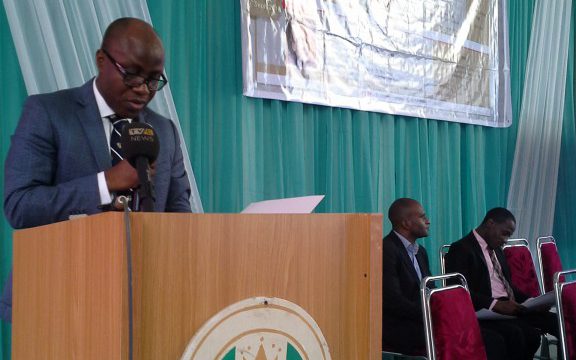
The Executive Secretary of the Nigerian Extractive Industries Transparency Initiative, Waziri Adio, has blamed successive managers of Nigeria’s economy for the current economic woes being faced by the country.
Mr. Adio spoke, Thursday, at the 2016 Academics Stand Against Poverty in Lagos.
“The fall in oil price is not the sole culprit for our current economic troubles,” said Mr. Adio, who delivered the keynote address.
“Believing that it is would delude the managers of the economy and diminish the country’s capacity to administer the right therapy.
“Here is where the political element becomes useful as an explanatory variable for this ailment, and also exposes the fall in prices as only an inevitable trigger.”
Mr. Adio said by their nature, natural resource revenues are easy to earn and easy to appropriate and expropriate.
“And since it is not revenue taxed from the sweat of citizens, the citizens are not involved in the process of generation or computation.
“This situation creates a huge incentive for capture by public officials. Its non-tax characteristic also makes managers of public resources less accountable. This inevitably fuels corruption and rent-seeking behaviours and intense competition for a time at the trough.
“According to Jeffery Sachs and Andrew Warner in a 2001 paper, the political process also gets captured, and then the “predatory state eclipses the developmental state”.
The NEITI boss further said abundant natural resources do not always lead to resource curse.
“It is clear that it is not what natural resources do to countries that causes the retrogression,” he said.
“Rather, it is what countries do with natural resources. Hence, it is not the case that natural resources in themselves are inherently tainted with a curse which, willy-nilly, afflicts the society where they are found and extracted.
“The exceptions provided by countries like Norway, Botswana and others show that resources do not come embedded with curses. The exceptions also show that when the right lessons are learned, the curse of resources can be reversed.”
This year’s ASAP conference, themed ‘Corruption, Transparency and Accountability in Public and Private Sector Organisations,’ reflects the near existential struggle in Africa, between pervasive official corruption, and the mainstreaming of poverty on the continent, according to Ismail Ibraheem, Co-Chair, ASAP, West Africa.
Musikilu Mojeed, Editor-in-Chief at PREMIUM TIMES, who spoke on ‘The Media and Investigative Journalism’ called on the media to check the “massive corruption” within its own ranks.
“For as long as the brown envelope syndrome continues to rock our newsrooms, investigative journalism will remain in short supply in our country,” said Mr. Mojeed.
“What moral right do we have to report on other people’s corruption when we are corrupt too
“The NUJ (Nigeria Union of Journalists) and the NGE (Nigerian Guild of Editors) must reconsider how they fund their activities.
“If we continue to allow state governors and other politicians to host us and fund our activities, we will remain weak in our effort to report on their indiscretions and corruption.”
In his welcome address, Rahman Bello, the Vice Chancellor of the University of Lagos, said universities had used research and curriculum to provide foundational and navigational tools to address the challenges of corruption.
“In our globalising world, universities provide the keys to unlock and nurture the opportunities to translate anticorruption ideas to realities that can shape and reshape our societies and make our world a better place to live in,” said Mr. Bello, who was represented by Duro Oni, Deputy Vice Chancellor,
Management Services.
“As the reach and complexity of global corruption increases exponentially all over the world, threatening even the secure boundaries and traditions of universities, there is an urgent need to realign the resources of universities to meet the needs of the people our educational systems are intended to serve.”
– Premium Times
mynet sunar